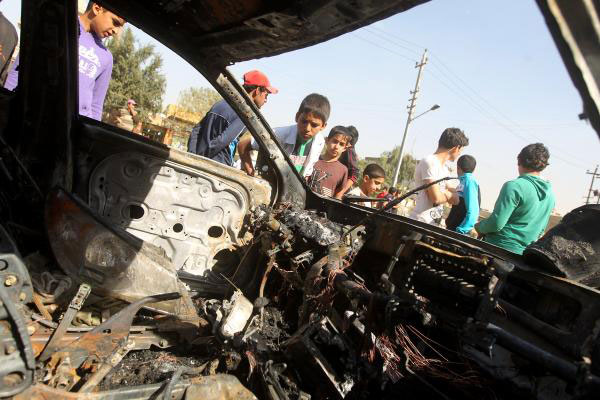
Iraqis inspect the site of a car bomb attack in Baghdad’s impoverished district of Sadr City on February 17, 2013. (AFP)
The terrorist organization said that it was taking revenge for perceived state repression of Sunni Muslims, in the latest round of violence to hit Iraq as it struggles with protests and political discord.
According to a statement carried on the SITE monitoring service, which tracks extremist Internet forums, the Islamic State of Iraq (ISI) carried out the attacks “in revenge for alleged criminal acts by the Shiite-led government in Sunnis areas of the capital.”
“We say to the Sunnis in Baghdad and elsewhere: The situation in which you are living today is exactly what the mujahideen warned you of years ago. You are walking in a dark tunnel,” said the statement posted on an Islamist website on Monday.
The al Qaeda affiliate Islamic State of Iraq and other Sunni Islamist groups oppose Prime Minister Nuri al-Maliki’s Shiite-led government which they say discriminates against the country’s Sunni minority.
Once at the heart of the insurgency against U.S. troops in Iraq, al Qaeda now targets mainly Shiites and local security forces in an attempt to trigger the kind of widespread sectarian violence that drove the country to the edge of civil war in 2006-2007.
At least eight car bombs exploded near shops, restaurants in Baghdad’s busy commercial streets on Sunday.
One blast tore off shop fronts in Qaiyara district while another left the remains of a car and its twisted engine littered across a high street in the busy, commercial Karrada district.
Insurgents are stepping up attacks at a time when Maliki is facing two months of protests by thousands of Sunni Muslims in western provinces, who accuse his government of marginalizing their sect.
The Baghdad bombings followed multiple attacks on Saturday that killed five people, including the head of Iraq’s intelligence academy.
Two suicide bombers killed Brigadier General Aouni Ali and two of his guards, and more bombings resulted in the deaths of a judge and an army lieutenant.
Members of the security forces and judicial officials are also often targeted by militants in Iraq.
The wave of attacks was the latest sign of a campaign that has escalated since the start of the year and had heightened the risk of wider inter-communal violence in the OPEC country.
Islamic State of Iraq and other Sunni Islamist groups have carried out at least one major assault a month since the last U.S. troops left in December 2011. But since January, more than ten suicide bombers have struck different targets.
